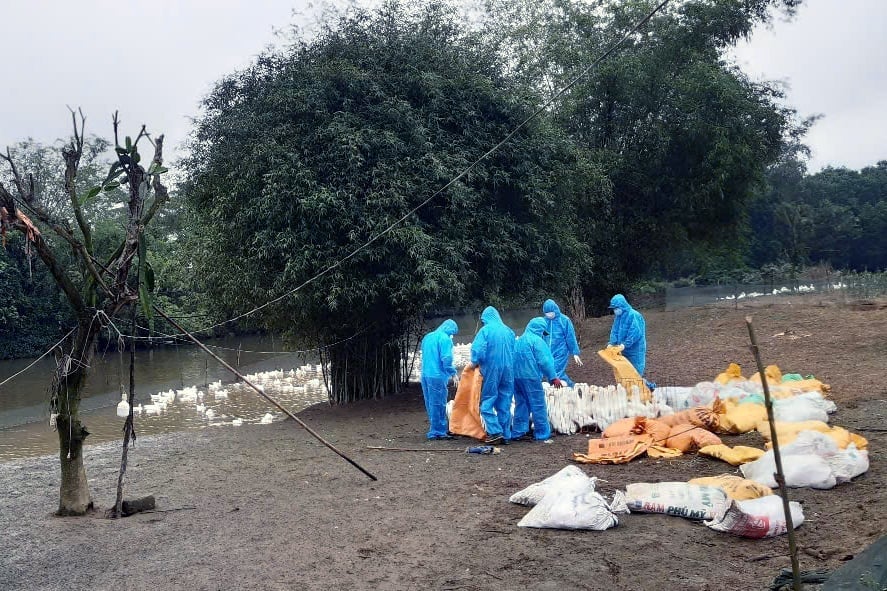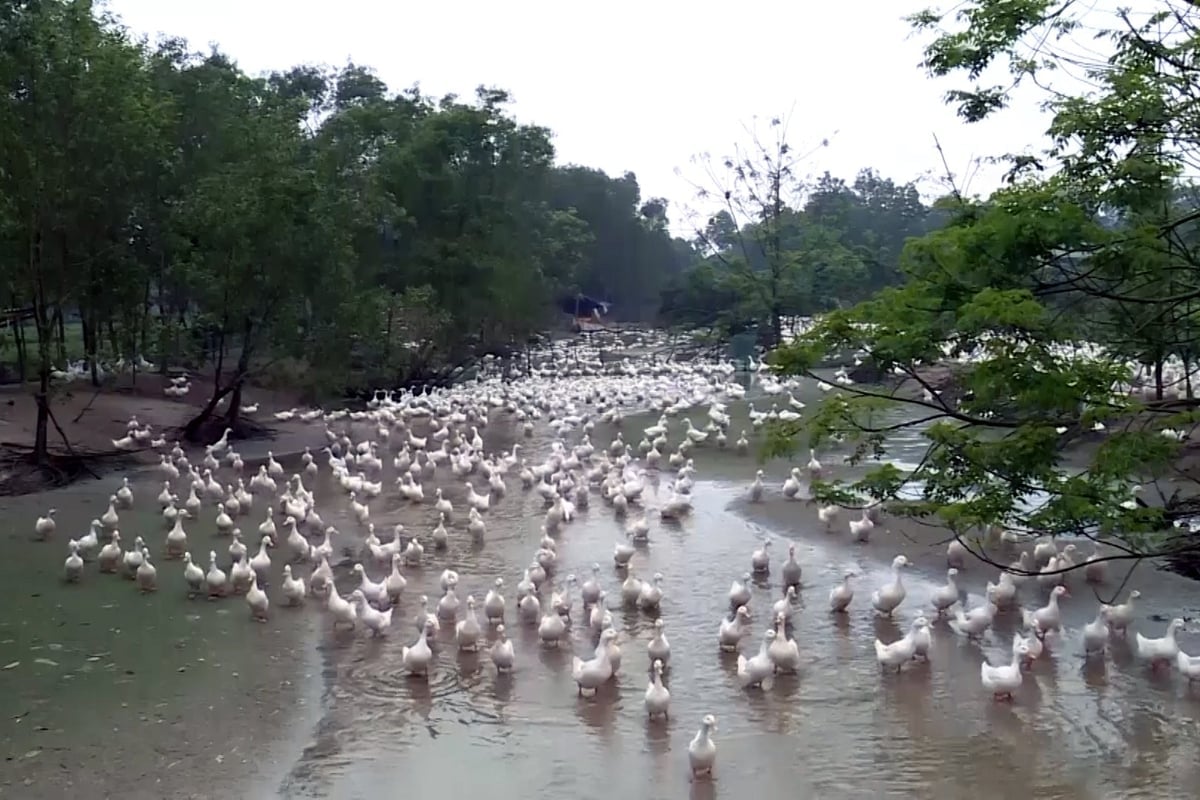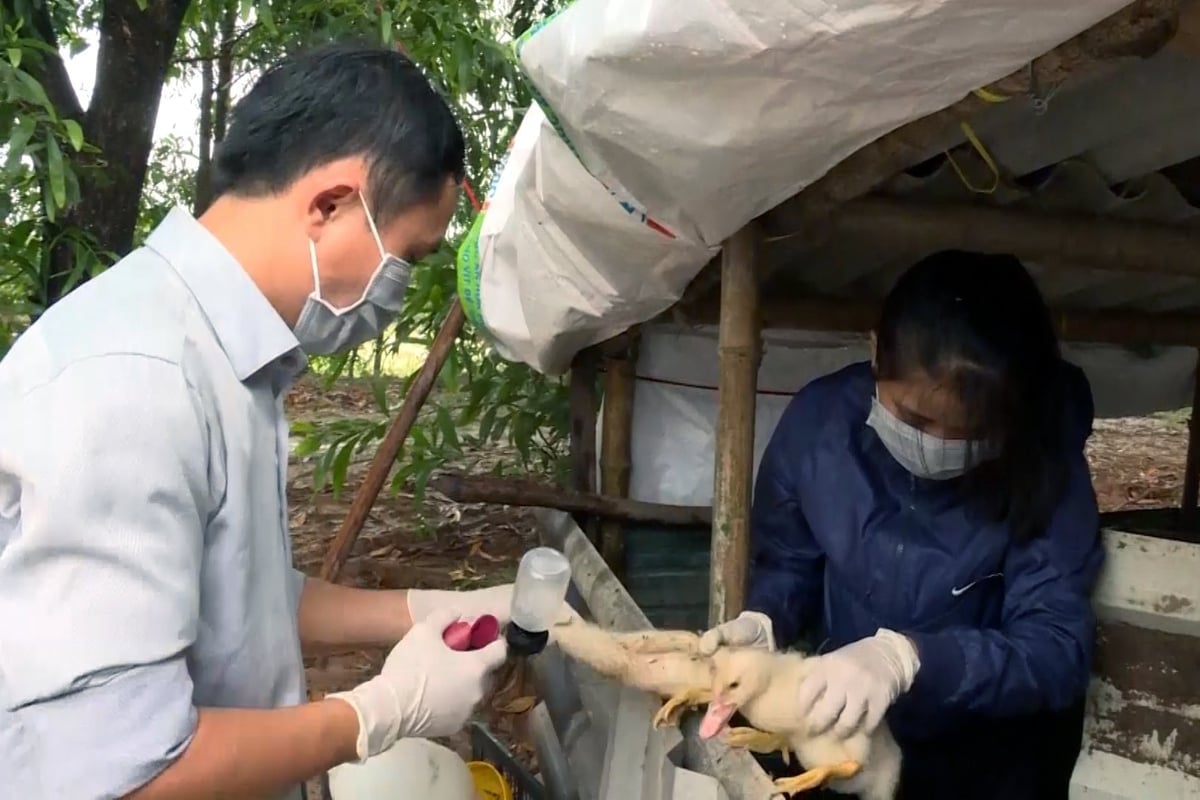December 4, 2025 | 14:04 GMT +7
December 4, 2025 | 14:04 GMT +7
Hotline: 0913.378.918
December 4, 2025 | 14:04 GMT +7
Hotline: 0913.378.918
In mid-February 2025, Doan Cuong in Tram Ly village, Hai Quy commune, Hai Lang district, Quang Tri bought 5,000 ducklings from two hatcheries in Trieu Phong district and raised them on the banks of the Nhung river.
On March 29, the ducks began to die sporadically. He tried to treat them himself but to no avail. On April 3, after 1,500 ducks had died, Cuong reported the situation to Hai Quy Commune People's Committee.

Local authorities destroy infected ducks at Doan Cuong's farm. Photo: Vo Dung.
Upon receiving the information, Quang Tri Department of Agriculture and Environment directed the Sub-Department of Livestock Production and Animal Health to work with the Livestock Production and Animal Health Stations of Hai Lang district and local forces to inspect and collect samples for testing.
The test result response form dated April 6 from the Sub-Department of Animal Health Region III concluded that the A/H5N1 avian influenza virus was detected in the sample taken from Cuong's duck flock. One thing to note was that his ducks, from the time they were purchased until they were destroyed, had not been fully vaccinated in accordance with regulations.
Cuong mentioned that vaccination against avian influenza was performed when the ducks were 16 - 20 days old. However, at that time, the ducks were continuously infected with ecoli and fowl cholera, so the family could not complete the full vaccination. When the ducks were about to be sold, the A/H5N1 epidemic emerged, resulting in a total loss of approximately VND 400 million for the family.
Over the past three years, avian influenza has not been reported in Quang Tri, leading farmers to become complacent and neglectful in disease prevention. This is the time when people buy ducklings to release them into the fields after the end of the winter - spring crop, but out of 34,000 ducks in Hai Quy commune, only about 6,000 have been vaccinated. The risk is always present.
“After detecting the outbreak, the commune established a steering committee to prevent the spread of A/H5N1 to both ducks and humans. We are conducting surveys and isolating people who are involved in the epidemic prevention activities. Currently, the locality is implementing vaccination in the area and has basically reached completion. Hai Quy Commune People's Committee will strengthen communication and resolutely handle households that do not comply with regulations,” said Le Van Lat, Vice Chairman of Hai Quy Commune People's Committee.

Spraying disinfectant at the site of avian influenza A/H5N1 outbreak. Photo: Vo Dung.
After the avian influenza outbreak, the people, authorities and functional forces of Quang Tri province quickly implemented disease prevention solutions. Along with destroying all diseased ducks, Hai Lang District Livestock Production and Animal Health Station provided 40 l of chemicals to organize daily disinfection at households with epidemics and in the entire commune. Poultry flocks in Hai Quy commune were also monitored and counted to receive urgent vaccination against avian influenza.

Quang Tri has 4 million poultry but the current vaccination rate is only 25%. Photo: Vo Dung.
Hai Lang District People’s Committee issued a document directing localities to urgently organize vaccination for poultry flocks and regularly check new poultry flocks for thorough vaccination.
Nguyen Phu Quoc, Deputy Director of the Department of Agriculture and Environment of Quang Tri, said, “Although the epidemic has been put under control, the risk of spreading remains very high. The reason is due to the subjective mentality of the people and the low vaccination rate. Some farmers buy breeds of unknown origin. The activities of illegal poultry trading, transportation, slaughter, and import have not been thoroughly managed. The breeding environment is contaminated with pathogens, not to mention unfavorable weather conditions reduce the resistance of poultry.”

Farmers must not stay complacent during the A/H5N1 avian influenza epidemic. Photo: Vo Dung.
Deputy Director Nguyen Phu Quoc requested Hai Lang District People’s Committee to focus on handling the outbreak, limiting the outbreak reoccurrence, and vaccinating poultry in epidemic areas and high-risk areas before April 20. Particularly in Hai Quy commune, vaccination must be completed before April 15.
He also stressed that the People’s Committee must take measures against localities that do not organize vaccination or have low vaccination rates against avian influenza, thus allowing outbreaks in poultry flocks. The local authority should resolutely not make a list of support requests for farmers whose poultry have been destroyed due to non-compliance with vaccination regulations against avian influenza.
Translated by Samuel Pham

(VAN) As of 2025, the ASEAN region has a total of 69 ASEAN Heritage Parks recognized across its 10 member states. Among them, Viet Nam contributes 15 ASEAN Heritage Parks.

(VAN) Yok Don National Park has high biodiversity with numerous endemic plant and animal species, and it is also the only dipterocarp forest ecosystem conservation area in Viet Nam.

(VAN) Viet Nam and Brunei signed two important MOUs on fisheries and IUU, expanding cooperation in agriculture, the environment, and Halal exports, aiming to substantively implement joint projects.

(VAN) The Viet Nam Coconut Association worked with the International Finance Corporation (IFC) and businesses to promote the supply chain, enhance competitiveness, and develop the coconut industry sustainably.
![Hue aims for Net Zero: [2] Pioneering low-emission tourism](https://t.ex-cdn.com/nongnghiepmoitruong.vn/608w/files/huytd/2025/12/04/0633-dulichzero-4-095634_236-161125.jpg)
(VAN) The ancient capital of Hue has developed Net Zero tourism products and models, aiming to reduce carbon emissions and pioneer the establishment of Viet Nam's green tourism destination.

(VAN) C.P. Viet Nam has announced the successful completion of its goal to plant 1.5 million trees during the 2021-2025 period, a key milestone within company's long-term ESG strategy and its roadmap for emission reduction.

(VAN) This is an initiative of MAE aimed at creating a unified coordination mechanism to implement agricultural cooperation programs with developing countries.